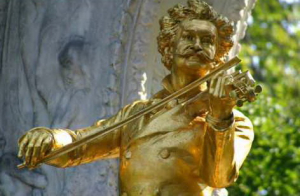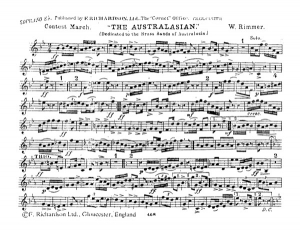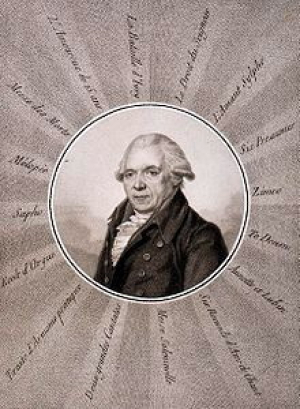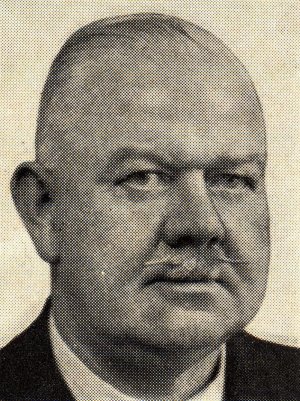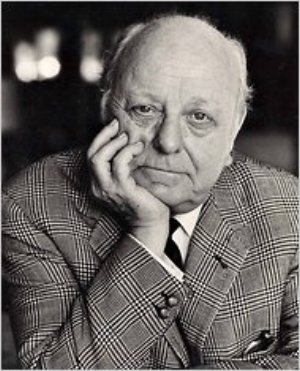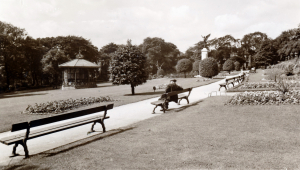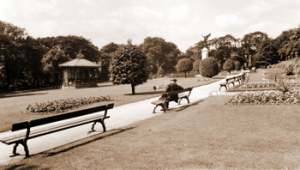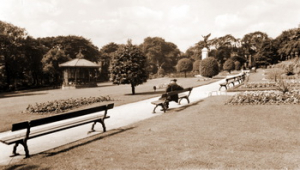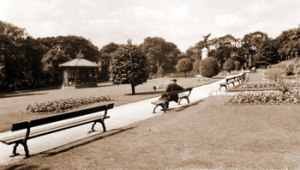
Talk Subjects
Chris Helme
Johann Strauss II wrote Morgenblatter (which translates to Morning Journals or Morning Papers) Op 279 in 1863 and was first performed the following year. We are featuring this waltz on today's show. It is played by the Munn and Felton's (Footwear) Band with Stanley Boddington conducting in 1961.
Brass bands don't seem to play waltzes these days. Back in the halcyon days of playing on the park bandstand at the height of summer during the post-wars years and through to the 1970s this kind of music was always a standard programme item.
Enjoy what is a rare performance of this waltz which was arranged for brass bands by Edrich Siebert...
The Australasian March written by William Rimmer which he dedicated to the brass bands of Australia. William Rimmer (1862–1936) was a Lancashire composer and conductor of brass band music who was particularly well known for his marches.
Here is the soprano cornet part which you can follow as the march is featured on this week's show played by the Queensland based Cairns Brass Band conducted by Maureen Cameron in 2006. The march was written before 1905 but the exact date is not known.
Enjoy...
Jean-Paul-Égide Martini, also known as Jean-Paul-Gilles Martini (31 August 1741 – 14 February 1816) was a French composer of German birth during the classical period. He is best known today for the vocal romance "Plaisir d'amour," on which the 1961 Elvis Presley pop standard "Can't Help Falling in Love" is based. He was often confused with the Italian composer Giovanni Battista Martini, so is sometimes known as Martini Il Tedesco ("Martini The German").
Martini was born in Bavaria as son of the schoolmaster Andreas Martin and his wife Barbara. He was educated at a Jesuit seminary and later started a study of philosophy in Frieberg, which he left without completing the course. He temporarily adopted the code name "Schwarzendorf", which is said to have been a means of trying to cover his tracks for the fear of being urged to refund his education costs.
He re-adopted his original family name in the Italianised form "Martini" after moving to France. There, he established a successful career as a court musician. In 1764, he married Marguerite Camelot. Having directed concerts for queen Marie Antoinette, he adapted to the changing regimes throughout the French Revolution, and later wrote music for Napoleon's marriage as well as for the restored Chapelle royale.
His highly popular church music combined old forms with modern theatricality, and his chansons including "Plaisir d'amour" were influential. In 1788, he paid 16.000 livres (an old French monetary unit) to become surintendant de la musique du roi. He was designated to take office after his predecessor's death, however the outbreak of the French Revolution prevented this. Martini lost all his functions and took flight to Lyon.
In 1800 he became a professor of composition at the Paris Conservatoire. In 1814, after the Bourbon Restoration, Martini was finally appointed surintendant de la musique du roi, the post that he had been promised more than 25 years earlier. His last composition was a requiem in honour of Louis XVI of France, which he performed in the Basilica of St Denis on 21 January 1816, the anniversary day of the monarch's execution. He died in Paris in February 1816 at the age of 74.
We are featuring Plaisir d'Amore as a cornet solo arranged by Peter Graham and played by Philip McCann accompanied by Sellers Engineering Band conducted by Roy Newsome.
Harold Moss (1891 - 1960) was a famous conductor, composer and judge in the British brass band sphere. He was also an accomplished trombonist and was known as The King of Trombones. He conducted Wingates Temperance Band from 1909 to 1936, and together they won the National British Brass Band Championships at the Crystal Palace in 1931.
From 1936 to 1948 he conducted Creswell Colliery. In 1948 he moved to Lancashire to conduct Leyland Motors Band. He composed several solos. Most notable of these is his cornet solo is The Nightingale.
Harold Moss was also an adjudicator many times at contests. He was a judge at the National Brass Band Championships of Great Britain six times: 1949, 1954, 1955, 1956, 1958 and 1959 and at the Northwest Regional Championships in 1960.
On this week's show Leyland Band play his march Royal Tiger which was adopted as the band's signature march in the 1950s.
Virgil Thomson (1896-1989) was a many-faceted American composer of great originality and a music critic. He composed in almost every genre of music, producing a highly original body of work rooted in American speech rhythms and hymnbook harmony.
Born in Kansas City, Missouri on November 25, 1896, he had a strong sense of place— rooted in heartland America and its Protestant traditions. His early connection to music came through the church, through piano lessons beginning at age five, and stints accompanying theatricals and silent films. The music he heard was part and parcel of the wide world around him: Civil War songs, cowboy songs, the blues, barn-dance music, Baptist hymns, folk songs, popular songs, in addition to the canons of Western art music that he studied. After his education he joined the army and was stationed in New York City. He was set for embarkation for France when the war ended.
It was now that his musical career began.
On this show we are featuring his 1949 composition 'At the Beach' which was written for solo trumpet and piano. Our performance is a cornet solo with the piano accompaniment.
Dr Joel Collier brings with him a wealth of experience in the areas of music performance, composition, conducting and pedagogy. Currently Assistant Professor of Music at Allen University, Columbia SC, Dr Collier studied for both his Masters and Doctorate in Euphonium Performance, Pedagogy, and Literature at James Madison University, under Kevin Stees. Prior to that he received his Bachelor of Science in Music Industry: Music Technology from Drexel University.
Dr Collier is a multi-award winning composer and euphonium soloist, regarded as “an excellent example of what’s good about the future of music.”. He is a multiple winner of the Drexel University Concerto Competition (2008 and 2010), obtained first place in the NABBA Low Brass Slow Melody Contest (2012), and was a finalist in the JMU Concerto Competition (2014). As a composer, he was the winner of the New York Staff Band Composer Contest in 2019 with his work Personent Hodie, while in 2018 and 2020 he came runner-up in the same competition. Dr Collier currently has 15 published works with The Salvation Army in the USA and the UK, as well as BrookWright Music and PrimaVista Musik.
As a euphonium soloist, he has held principal positions with Atlantic Brass Band, JMU Brass Band, National Capital Band and River Brass, whilst also being a soloist for the Southern Territorial Band, The Salvation Army’s premier band in the southern states of the United States. Dr Collier has two solo CDs to his name – Shadowed (2015), where he features as a euphonium soloist with brass band, and Dream Big Little One (2020), a solo piano recording of all original lullabies. In addition, he features on a number of other recordings for groups including the Southern Territorial Band, National Capital Band, Drexel Fusion Band and Pendel Brass.
In the field of education, Dr Collier has wide ranging experience having been a summer music instructor at various summer music conservatories across the United States, where he fulfilled the roles of Band Director, Faculty Brass Ensemble Performer, and Private Lesson Instructor. Between 2011 and 2013 he was a Graduate Assistant at James Madison University, before progressing to Doctoral Teaching Assistant at the same university until 2016. Dr Collier enjoyed a brief season from 2016-2017 as Creative Arts Director for The Salvation Army in Fredericksburg, directing weekly music and arts programs. Between 2017 and 2021 he was the Divisional Music Director for The Salvation Army’s Kentucky and Tennessee Division, overseeing all the music and arts programs.
Between 2014 and 2020 Dr Collier was on the Board of Directors for the North American Brass Band Association (NABBA), serving as Vice President between 2017 and 2019. He was also Band Manager for the Massanutten Youth Brass Band from 2012 to 2016. He is currently a Besson Performing Artist and plays on a Besson 2052 euphonium. For more information about Dr Joel Collier’s music please visit www.joelcollier.com.
On this show we are featuring his composition 'Martchless King'
Talks Available
All the presentations are timed to last up to an hour except where shown - questions are gladly taken after the presentation. All have been presented to male, female and mixed audiences of varying age groups.
-
A Postcard from the Past
The Sunny Vale Pleasure Gardens, Halifax - Yorkshire’s Alton Towers of the…
-
All in a Days Work
Reminiscences from 30 years in the Police Service – (humorous lecture presentation)…
-
Legends from the world of Brass Bands
(Info-tainment – digital slides & music) – 1 hour presentation.
-
A Week in May
A story based on the Murder of Lord Frederick Cavendish (of the…
- Memories of Christmas Past
-
The Road to Publication
In 1979 I was asked to assist in presenting a series of…
-
How we used to live
We have all seen and experienced changes in our lives. Bring back…
- Holiday Memories from the Past
-
Other Folks Rubbish (Not suited to a Zoom presentation)
With a local history theme… – (thought provoking humorous lecture presentation) –…
- So you want to be a Pirate ? - The life of a Pirate was not all that it seemed
- Superstitions, New Year Resolutions and the Origins of St Valentine's Day
- Brighouse at Work
-
Sorry but I am not able to accept any more face to face talk bookings at the present time ONLY ZOOM TALKS


